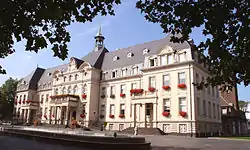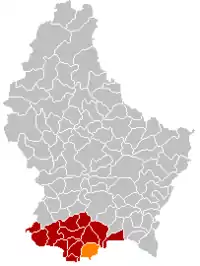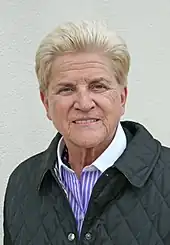Dudelange
Dudelange (French: [dyd(ə)lɑ̃ʒ]; Luxembourgish: Diddeleng [ˈdidəleŋ] ⓘ; German: Düdelingen [ˈdyːdəlɪŋən]) is a commune with town status in southern Luxembourg. It is the fourth-most populous commune, with 19,734 inhabitants. Dudelange is situated close to the border with France.
Dudelange
Diddeleng | |
|---|---|
 The town hall | |
.svg.png.webp) Coat of arms | |
 Map of Luxembourg with Dudelange highlighted in orange, and the canton in dark red | |
| Coordinates: 49.4833°N 6.0833°E | |
| Country | |
| Canton | Esch-sur-Alzette |
| Government | |
| • Mayor | Dan Biancalana (LSAP) |
| Area | |
| • Total | 21.38 km2 (8.25 sq mi) |
| • Rank | 51st of 102 |
| Highest elevation | 435 m (1,427 ft) |
| • Rank | 26th of 102 |
| Lowest elevation | 256 m (840 ft) |
| • Rank | 60th of 102 |
| Population (2023) | |
| • Total | 21,953 |
| • Rank | 4th of 102 |
| • Density | 1,000/km2 (2,700/sq mi) |
| • Rank | 7th of 102 |
| Time zone | UTC+1 (CET) |
| • Summer (DST) | UTC+2 (CEST) |
| LAU 2 | LU0000203 |
| Website | dudelange.lu |
| Click on the map for a fullscreen view | |
As of 2015, the town of Dudelange, which lies in the centre of the commune, has a population of 19,734, making it Luxembourg's third-most populous town. The commune also includes the smaller town of Budersberg, to the north-west. The Mont Saint-Jean, close to Budersberg, hosts the ruins of a medieval castle. In 1794 the French Revolutionary Army committed atrocities against the local population in Dudelange, when they massacred 79 civilians.[1]
Dudelange is an important industrial town that grew out of the three villages and a steel mill in 1900. The D in the name of the ARBED steel company, later merged into ArcelorMittal, stood for Dudelange. As well as the Dudelange Radio Tower, an FM radio and television transmitter, it is also the site of the Centre national de l’audiovisuel (CNA), a cultural institute founded in 1989 under the aegis of the Ministry of Culture in order to preserve, promote and exhibit Luxembourg's audiovisual and photographic heritage. The centre hosts a two-screen cinema, a restaurant and a library focused on the visual arts.
Population
Sports
Dudelange is home to Luxembourg's most successful football club in recent times. F91 Dudelange won nine national titles between 2000 and 2011.
Notable people



_Urmas_Reinsalu_and_Etienne_Schneider_(34915138884)_-_crop_Schneider.jpg.webp)
- Dominique Lang (1874–1919), Impressionist painter [3]
- Jean Hengen (1912–2005) was a Luxembourgian prelate of the Roman Catholic Church, Bishop of Luxembourg 1971-1990
- Pierre Cao (born 1937) a Luxembourgian composer and conductor
- Germaine Goetzinger (born 1947) a Luxembourg writer, historian, educator and feminist
- Jean Back (born 1953) a Luxembourg writer, photographer and civil servant
- Roland Bombardella (born 1957) a Luxembourgian soldier and retired sprinter, competed in the 1976 Summer Olympics
- Andy Bausch (born 1959) studied painting and photography, interested in rock music
- Sport
- Ernest Mengel (1913–1968) a Luxembourgian footballer, competed at the 1936 Summer Olympics
- Jos Romersa (1915–2016) a Luxembourgian gymnast who competed in the 1936 Summer Olympics
- Camille Libar (1917–1991) a football player and manager from Luxembourg
- Nicolas Pauly (1919–1981) a Luxembourgian footballer, competed at the 1948 Summer Olympics
- Raymond Wagner (1921–1997) a Luxembourgian footballer, competed at the 1948 Summer Olympics
- Bernard Michaux (1921–1987) a Luxembourgian footballer, competed in the 1948 Summer Olympics
- Victor Feller (1923–1997) a Luxembourgian footballer, competed at the 1948 Summer Olympics
- Bruno Mattiussi (1926–1981) a Luxembourgian boxer, competed at light middleweight at the 1952 Summer Olympics
- Fred Stürmer (1927–2014) a Luxembourgian boxer, competed in the middleweight at the 1952 Summer Olympics
- Jean Schmit (1931–2010) a Luxembourgian cyclist, competed in the individual and team road race events at the 1952 Summer Olympics
- Jean Aniset (born 1934) a Luxembourgian long-distance runner, competed in the marathon at the 1964 Summer Olympics
- Henri Cirelli (1934–2021), international footballer
- Robert Schiel (born 1939) a Luxembourgian fencer, competed at the 1960, 1972 and 1976 Summer Olympics
- Roger Gilson (1947–1995) a Luxembourgian cyclist, competed in the individual road race at the 1968 Summer Olympics
- René Peters (born 1981) a Luxembourgish football player, former captain of the national team
- Kari Peters (born 1985) a Luxembourger cross-country skier, competed at the 2014 Winter Olympics
- Ben Gastauer (born 1987), professional cyclist
- Fleur Maxwell (born 1988) a Luxembourgian figure skater, competed in the 2006 Winter Olympics
- Politics
- Nicolas Biever (1894–1965) a Luxembourgian politician
- Nicolas Estgen (1930–2019) a retired Luxembourgish politician
- Bernard Berg (1931–2019) a Luxembourgish politician and trade unionist
- Colette Flesch (born 1937) a Luxembourgish politician and former fencer, competed at the 1960, 1964 and 1968 Summer Olympics
- Erna Hennicot-Schoepges (born 1941) a Luxembourgish politician
- Mars Di Bartolomeo (born 1952) a Luxembourgish politician
- Alex Bodry (born 1958) a politician from Luxembourg.
- Lydia Mutsch (born 1961) a Luxembourgish politician
- Josée Lorsché (born 1961), Green member of the Chamber of Deputies since 2011
- Etienne Schneider (born 1971) a Luxembourg politician and economist, Deputy Prime Minister and Minister of the Economy.
Twin towns – sister cities
See also
References
- Manuel D'Histoire Nationale 7e édition p. 161 par Nicolas Margue et Joseph Meyers, 1966
- "Population par canton et commune". statistiques.public.lu. Archived from the original on 2016-09-12. Retrieved 11 January 2022.
- "Dominique Lang (1874-1919)" Archived 2010-09-29 at the Wayback Machine, Centre de Documentation sur les Migrations Humaines. (in French) Retrieved 22 January 2011.
- "Villes jumelées" (in French). Dudelange. Retrieved 2019-09-02.
External links
 Media related to Dudelange at Wikimedia Commons
Media related to Dudelange at Wikimedia Commons- Commune of Dudelange official website
- Miscellaneous links
